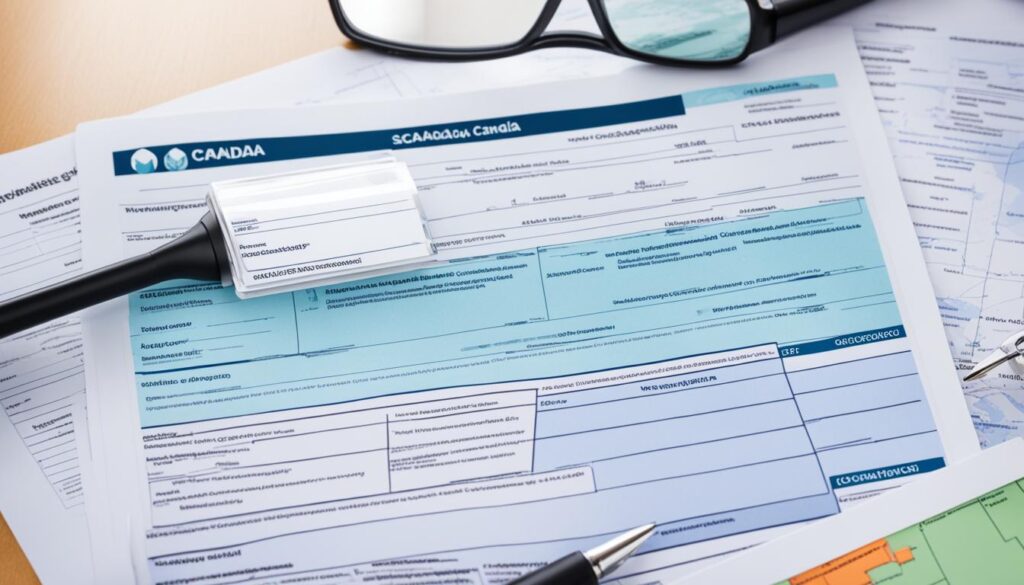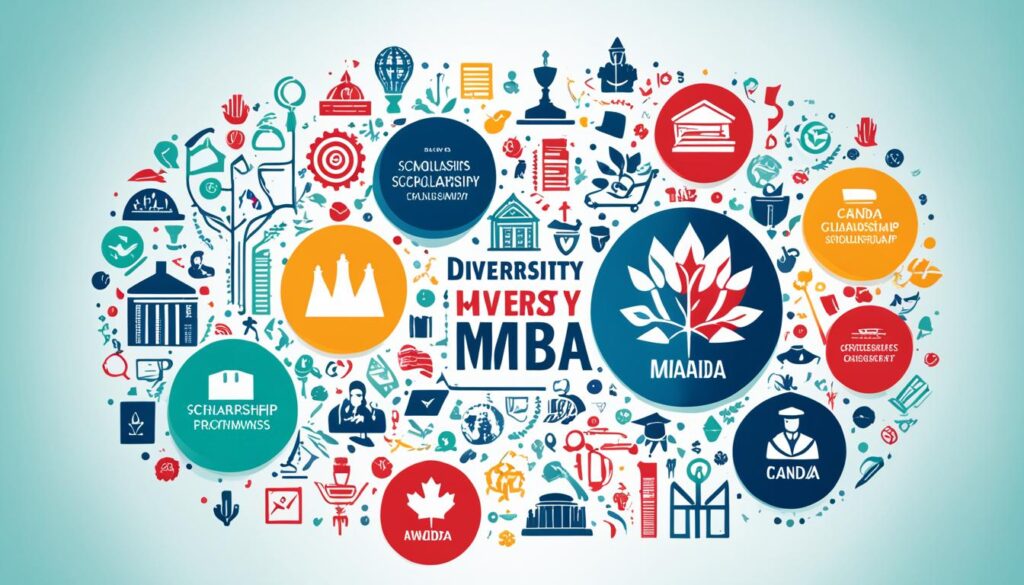Getting an MBA in Canada can cost a lot, from 40,000 CAD to 150,000 CAD. But, there’s good news for international students. They can find MBA scholarships in Canada to lower their costs. This article will look at the best MBA scholarships in Canada, who can apply, how to apply, and other ways international students can get help with money.
Key Takeaways
- Canadian universities offer a variety of MBA scholarship programs to help international students finance their education.
- Scholarships are awarded based on academic excellence, leadership potential, and financial need.
- The application process often involves submitting a CV, letters of recommendation, and a statement of purpose.
- In addition to scholarships, international students can explore student loans, on-campus employment, and other funding options to cover their MBA expenses.
- Maintaining strong academic performance is crucial to renew and retain scholarship eligibility throughout the MBA program.
What are MBA Scholarship Programs?
MBA scholarship programs in Canada are special awards for top students. They show great academic skills, leadership, and a deep commitment to their field. Top universities like the University of Toronto, the University of British Columbia, and McGill University offer these scholarships.
Overview of MBA Scholarships Offered by Canadian Universities
Canadian universities have many MBA scholarships for the best students. These scholarships help cover tuition, living costs, and offer networking chances and global connections. They look for students with high grades, leadership, and a wish to help the business world.
Benefits of Securing an MBA Scholarship in Canada
- Reduced financial burden: MBA scholarships can greatly lower tuition costs. This lets students focus on their studies without money worries.
- Increased opportunities: Getting a scholarship opens doors to top programs, international chances, and networking in the business world.
- Enhanced learning experience: Scholarship winners get special resources, mentorship, and exclusive events. This makes their MBA experience better.
- Competitive edge: An MBA scholarship shows a student’s academic and leadership skills. This can give them a job advantage.
By using the many scholarship opportunities at Canadian universities, future MBA students can lessen their study costs. They also get many chances for personal and career growth.
Top Canadian Universities Offering MBA Scholarships
Canada is home to top universities with great MBA scholarship programs. These programs help graduate students by easing their financial worries. This lets them focus on their studies and reach their goals. The University of Toronto, the University of British Columbia, and McGill University are known for their generous scholarships.
University of Toronto (Rotman School of Management)
The Rotman School of Management at the University of Toronto is a top business school in Canada. It offers many MBA scholarships, like the Rotman Scholarship, the Desai Scholarships, and the Undergraduate Admission Scholarships. These are given for academic success, leadership, and financial need.
University of British Columbia (Sauder School of Business)
The Sauder School of Business at the University of British Columbia is also a leading institution. It has great MBA scholarship options. The International Leader of Tomorrow Award and Donald Wehrung International Student Award are for outstanding international students. Sauder also has scholarships for both domestic and international MBA students based on merit and need.
McGill University (Desautels Faculty of Management)
McGill University’s Desautels Faculty of Management is well-known for its MBA scholarships. It offers the Desautels MBA Entrance Scholarships and Desautels MBA Leadership Scholarships. These are for students with high academic achievements, leadership skills, and financial need.
These top Canadian universities have a tradition of offering MBA scholarships that change lives. With these scholarships, graduate students can get top business education. This helps them succeed in the global job market.
Eligibility Criteria for MBA Scholarship Programs

To get into MBA scholarship programs in Canada, you need to show you’re a top student and a great leader. The main things you must do include:
Academic Excellence and GMAT/GRE Scores
MBA scholarships in Canada really value good grades. You should have a high undergraduate GPA, usually 3.5 or more. Also, a high score on the GMAT or GRE, over 600, can really help you get a scholarship.
Work Experience and Leadership Potential
Canadian MBA scholarships also look for work experience and leadership skills. You should have at least 2-3 years of work experience. This experience should show you can lead teams, manage projects, and make a big impact at work.
| Eligibility Criteria | Description |
|---|---|
| Academic Excellence | Minimum 3.5 undergraduate GPA |
| GMAT/GRE Scores | Typically 600 or higher |
| Work Experience | Minimum 2-3 years of professional experience |
| Leadership Potential | Demonstrated ability to lead teams and drive results |
Meeting these tough criteria can really up your chances of getting a top MBA scholarship in Canada.
Application Process for MBA Scholarship Programs
Getting an MBA scholarship in Canada is tough but possible with a good plan. Students need to follow several steps to be in the running for these top awards.
- Identify Eligible Scholarship Programs: Start by looking for MBA scholarships at Canadian universities that fit your goals. Make sure to check the eligibility, deadlines, and what you need to send in.
- Prepare a Compelling Application: After picking the right programs, work on your application. You’ll need to send in a resume, transcripts, letters of recommendation, a statement of purpose, and maybe even go for an interview.
- Demonstrate Academic Excellence: Canadian MBA scholarships value your grades and test scores. Make sure your GPA, GMAT or GRE scores, and overall grades are strong. This will help you stand out.
- Highlight Relevant Experience: It’s not just about grades. Scholarship programs look at your work history, leadership skills, and other activities. Show how these make you a great fit for the MBA program and your future career.
- Submit a Polished Application: Finally, make sure your application is in on time and complete. Pay attention to the details and present your application professionally. This can really help you in the review process.
By taking these steps and making a strong application, students can boost their chances of getting an MBA scholarship in Canada. This can help them get the financial aid they need for their graduate studies.
| Application Requirement | Description |
|---|---|
| Transcript | Applicants must send official transcripts from all past schools to show their grades. |
| GMAT/GRE Score | Most programs want a good GMAT or GRE score as part of your application. |
| Letter of Recommendation | Applicants need to get one or more letters from people who know them well. These letters should talk about the applicant’s skills and potential. |
| Statement of Purpose | This statement lets applicants share why they want an MBA, their career goals, and how the scholarship will help them reach those goals. |
| Resume/CV | A detailed resume or CV is key. It should highlight your work history, leadership skills, and other activities. |
By putting together a complete and strong application, students show they’re serious about their future. This can really up their chances of getting an MBA scholarship in Canada.
Scholarship Programs for International Students
Canadian universities know how crucial it is to support international students in MBA programs. They offer special scholarships to help these students with their costs. These scholarships aim to remove financial hurdles and give access to top-notch education.
Scholarships for International MBA Applicants
Top Canadian universities have scholarships just for international MBA students. These scholarships can cover tuition, living costs, and more. Some top scholarships for international MBA students are:
- University of Toronto (Rotman School of Management) International MBA Scholarship
- University of British Columbia (Sauder School of Business) International Graduate Scholarship
- McGill University (Desautels Faculty of Management) International Student Bursary
Requirements for International Students
To get these scholarships, international students must meet certain criteria:
- Have a valid study permit or visa for Canada
- Show top academic performance, often with a minimum GPA
- Provide strong GMAT or GRE scores
- Highlight leadership skills, extracurricular activities, and a deep commitment to their field
- Submit a detailed scholarship application, including essays, letters of recommendation, and a financial need statement
International students should look into each scholarship’s specific rules and deadlines. This way, they can boost their chances of getting funding for their MBA in Canada.
“Securing a scholarship has been a game-changer for my MBA journey. The financial support has allowed me to focus on my studies and actively engage in the vibrant campus community.”
– Anita, international MBA student at the University of British Columbia
Financial Aid and Funding Options
International students in Canada can find more ways to pay for their MBA besides scholarships. These options can help make getting an MBA possible, even if you’re on a tight budget.
Student Loans and Education Financing
Canadian universities offer student loans to help international MBA students pay for school. These loans come from government agencies or private lenders. They cover tuition, living costs, and other school expenses. Some schools also offer payment plans or deferred payments to ease the financial load.
On-Campus Employment Opportunities
- Graduate assistantships: Some universities offer jobs for international MBA students, like research or teaching. These jobs help with money and give valuable work experience.
- Part-time jobs: International students can work up to 20 hours a week on campus. This gives them extra money to help pay for school.
- Work-study programs: Many schools have work-study programs. Students can earn money by working in different campus areas.
Looking into these funding options can help international students lessen their scholarship needs. This way, they can still get an MBA in Canada, even with limited money.
“Getting financial aid is key for international students to achieve their MBA dreams in Canada. Student loans, education financing, and on-campus jobs can make things easier and lighten the financial load.”
Tips for Maximizing Scholarship Chances

Getting an MBA scholarship in Canada needs a strategic plan. Focus on making a strong profile and application. This should show off your unique skills and achievements.
Building a Strong Profile and Application
When you apply for MBA scholarships, make sure your profile is complete and strong. First, make sure your grades are top-notch. A good GMAT or GRE score shows you’re smart.
Also, talk about your work experience and leadership skills. These are important to scholarship committees.
- Maintain a high GPA throughout your academic journey
- Achieve a competitive GMAT or GRE score
- Demonstrate substantial work experience, ideally in a managerial or leadership role
- Showcase your involvement in extracurricular activities and community service
Highlighting Unique Qualities and Achievements
To be noticed, focus on what makes you different. Talk about your personal strengths and what you’ve achieved. Create a story that shows you’re ready for the MBA program and can make a difference at the university.
“The key to securing an MBA scholarship in Canada is to build a profile that highlights your unique qualities and demonstrates your potential for academic and professional excellence.” – MBA Admissions Advisor
Also, mention any special challenges you’ve faced and how you’ve overcome them. Scholarship committees like to see this and it sets you apart from others.
By using these tips, you can boost your chances of getting an MBA scholarship in Canada. This is a big step towards reaching your goals in education and your career.
Scholarship Programs for Specific Backgrounds

Canadian universities offer special scholarships for certain groups and backgrounds. These scholarships help students from underrepresented groups. They also give financial aid to students from diverse backgrounds.
Scholarships for Women, Minorities, and Underrepresented Groups
Canadian universities value diversity and inclusion in education. They offer scholarships for women, minority students, and underrepresented groups. These scholarships help financially and encourage these students to follow their MBA dreams.
- The University of Toronto’s Rotman School of Management offers the Women in Management Scholarship, which awards financial assistance to outstanding female applicants.
- The University of British Columbia’s Sauder School of Business provides the David Lam Scholarship for Indigenous students, supporting the educational aspirations of Canada’s First Nations, Inuit, and Métis populations.
- McGill University’s Desautels Faculty of Management has the Desautels Diversity Scholarship, aimed at fostering a more inclusive and representative student body.
Industry-Specific Scholarships
Canadian universities also have scholarships for specific industries. These scholarships help students with a strong interest or background in fields like technology, entrepreneurship, or sustainability.
| Scholarship | University | Focus Area |
|---|---|---|
| Scotiabank Fintech and Entrepreneur Scholarship | University of Toronto (Rotman) | Fintech and Entrepreneurship |
| Sauder Energy and Sustainability Scholarship | University of British Columbia (Sauder) | Energy and Sustainability |
| Desautels Innovation and Entrepreneurship Scholarship | McGill University (Desautels) | Innovation and Entrepreneurship |
These industry-specific scholarships let students match their academic and career goals. They also offer financial support for their MBA specialization.
Maintaining Scholarship Eligibility
Getting an MBA scholarship in Canada is a big step. But, you must keep up with the scholarship rules to keep getting it. You need to know the academic standards and how to renew your scholarship for future years.
Academic Performance Requirements
Most MBA scholarships in Canada require you to keep up good grades. You usually need a GPA of 3.5 to 4.0 on a 4.0 scale. If you don’t keep up, you could lose your scholarship.
Some scholarships also want you to be active in school, volunteer, or take on leadership roles. These activities show you’re fully engaged and committed to your studies.
Renewal Criteria for Multi-Year Scholarships
- Many MBA scholarships in Canada last for several years, helping you financially during your studies. But, you must keep up your good grades and follow the program’s rules to get it renewed.
- To renew your scholarship, you might need to apply again, send in new transcripts, or show you’re still involved in the program.
- It’s important to know what your scholarship needs to renew and keep up with your school and extra activities. This way, you can keep getting your financial help.
By following the rules for grades and renewal, MBA scholarship winners in Canada can keep getting their financial aid. This lets them focus on their studies and personal growth during this important time.
Also Read: Imperial College London: Premier UK Education Hub
Conclusion
Getting an MBA in Canada can be costly, but scholarships can help. Universities like the University of Toronto, the University of British Columbia, and McGill University offer scholarships. These are given for academic success, leadership, and diverse backgrounds.
Scholarships don’t just give money. They also offer a top-notch education, chances to network, and skills for the global business world. With these scholarships, international students can follow their MBA dreams in Canada and set themselves up for a bright future.
If you’re a top student, a leader, or part of a group often overlooked, there are scholarships for you. Look into the rules and how to apply to boost your chances of getting the funds you need. This way, you can turn your MBA dream into reality.
FAQs
Q: How can I apply for scholarships to pursue an MBA in Canada?
A: You can apply for scholarships by checking with the specific universities offering MBA programs in Canada for their scholarship opportunities and application processes.
Q: What types of scholarships are available for graduate students pursuing an MBA in Canada?
A: There are various types of scholarships available, including merit scholarships, financial need-based scholarships, industry-specific scholarships, and scholarships for international students.
Q: How are scholarship awards determined for MBA students in Canada?
A: Scholarship awards are typically determined based on academic achievements, leadership potential, extracurricular activities, and sometimes financial need.
Q: Are there scholarship and grant options available for MBA students in Canada?
A: Yes, many universities and organizations offer scholarships and grants to support MBA students in Canada with their tuition fees and living expenses.
Q: How can I find scholarships and financial aid for my MBA program in Canada?
A: You can search for scholarships and financial aid opportunities through university websites, scholarship search engines, and government-funded student aid programs.
Q: Who is eligible to apply for scholarships for MBA programs in Canada?
A: Eligibility criteria for scholarships vary but generally include factors such as academic performance, leadership skills, community involvement, and sometimes financial need.
Q: What kind of scholarships are available for current MBA students in Canada?
A: There are scholarships available for current MBA students based on their academic performance, research interests, industry connections, and participation in extracurricular activities.
Source Links
- https://yocket.com/blog/mba-scholarships-in-canada
- https://tcglobal.com/scholarships-for-mba-in-canada/
- https://www.hotcoursesabroad.com/study/international-scholarships/canada/qn/mba/32/qid/k/scholarship.html